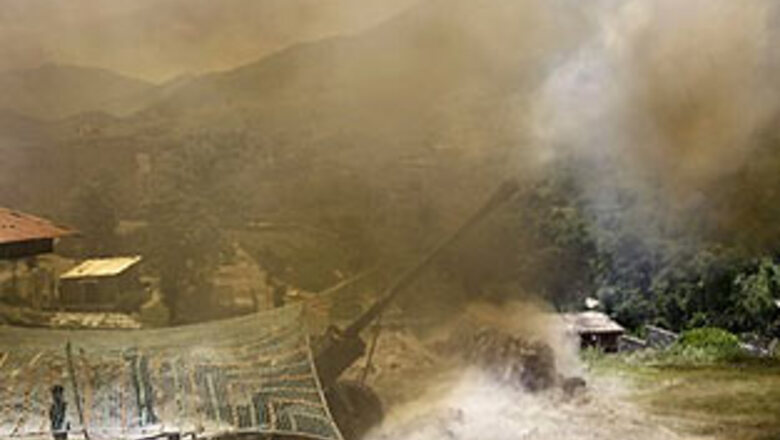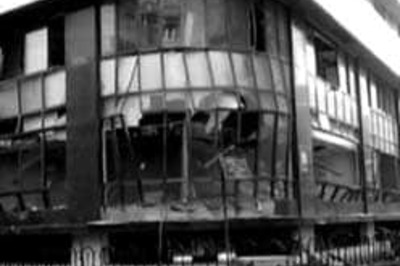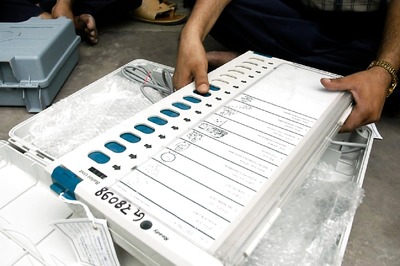
views
Islamabad: Pakistani airstrikes killed dozens of Taliban fighters in a fierce struggle to drive them from a district near the capital, while the militants took over police stations and kidnapped more than 50 security forces, the army said.
One member of the security forces also died in the fighting, the top military spokesman said.
Pakistan is acting under intense US pressure to take a tougher line against Islamist militants expanding from strongholds along the Afghan border, where al-Qaeda leaders including Osama bin Laden may also be hiding.
In recent days, government forces have begun trying to force the Taliban back into the Swat Valley, from where they had pushed out in the direction of an increasingly nervy Islamabad under the cover of a controversial peace process.
Maj Gen Athar Abbas said helicopters inserted commandos into the main town in Buner, a once-peaceful farming region in the northwest, on Wednesday morning just as ground troops fought their way in from three directions.
Militants were putting up stiff resistance and detonated three roadside bombs near the Ambela Pass, a key gateway to the mountainous region. Three more troops were injured, he said.
After warplanes carried out airstrikes late Tuesday, attack helicopters engaged "miscreants" and killed more than 50, Abbas said at a news conference in Rawalpindi, a garrison city south of Islamabad.
Rather than fleeing, militants seized three police stations in the north of Buner on Tuesday and kidnapped 70 police and paramilitary troops, he said. Eighteen of the troops were "recovered" on Wednesday, he said giving few other details.
Security forces prevented some reporters from entering the area and telephone services were interrupted, making it hard to verify the army's account of the fighting.
The Taliban advance into Buner brought them to within 60 miles (100 kilometers) of the capital, Islamabad, raising concern about the stability of the nuclear-armed country.
The army also says troops have killed scores of militants in recent fighting in Lower Dir, another area neighboring Swat.
Both lie within Malakand, the region covered by the government's much-criticized peace deal. Officials agreed to impose Islamic law in return for peace in a region devastated by two years of bloody fighting.
PAGE_BREAK
Pakistani officials said the Islamic law concession robbed the militants of any justification for retaining their arms. They insist they will use force against militants who defy the government.
But officials in Washington, which is propping up Pakistan's army and government with billions of dollars and worrying about the rising insurgency in neighboring Afghanistan, have slammed the peace process as a surrender and welcomed the resumption of military action.
The Pakistani offensives are "exactly the appropriate response" to the Taliban advance, Pentagon spokesman Geoff Morrell said Tuesday.
"We are hopeful and encouraging of the Pakistani military that they are able to sustain these operations against the militants and to stem this encroachment on the more populated areas of Pakistan."
The Obama administration has an opportunity to reiterate that demand when Pakistani President Asif Ali Zardari joins his Afghan counterpart in Washington for talks next week.
Pakistan has waged several offensives in the border region since turning against its former Taliban allies and allying with the United States following the Sept. 11, 2001 terrorist attacks.
But the operations resulted in the deaths of hundreds of civilians and the flight of hundreds of thousands of others, and were often halted by short-lived peace deals from which militants emerged stronger than before.
Amnesty International estimated Wednesday that at least 33,000 civilians have fled their homes to avoid the recent clashes in Lower Dir alone.
Witnesses told of bodies left lying in the fields because residents were too scared to move them, the rights groups said. At least five civilians died, it said.
Hundreds of thousands of displaced people have yet to return to Swat or to Bajur, a tribal region on the Afghan border where the Pakistani military claimed victory over militants earlier this year. Many are living in makeshift camps and growing increasingly angry at their treatment by the authorities.
"Pakistan is now facing a serious displacement crisis," said Sam Zarifi, Amnesty International's Asia-Pacific director. "While the politicians in Islamabad and Washington talk about geopolitics, people in these quiet villages have their lives shattered."
Abbas said the troops faced an estimated 450-500 militants in Buner and forecast Wednesday that the operation to drive them out would take about a week.
He has dismissed fears that the capital Islamabad, separated from Buner by the Indus River and the Margalla Hills, was under any threat of a militant takeover as alarmist, expressing a confidence in Pakistan's huge army that many Western observers do not share.



















Comments
0 comment